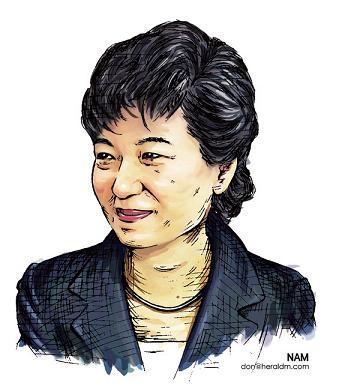
Park has met increased pressure, even from within her own camp, to offer a clear apology to soothe the angst felt by descendents of those active in the democratic movements during her father’s rule.
But torn by her personal sense of duty to uphold her deceased father’s feats, Park has sidestepped questions about her historical perceptions, much to the concern of her fellow party members and campaigners that it might cost the frontrunner support from moderate voters.
“While the conservative voters will continue their sturdy support, Park may lose the support from the moderate voters that she managed to earn with her campaign focusing on unity right after winning the party’s candidacy,” said Yoon Hee-woong, a senior researcher at Korea Society Opinion Institute, a polling agency.
Spurred by her recent comments during a radio interview Monday when she seemingly denied the transgressions committed in the execution of eight activists in 1975 under her father’s rule, the main opposition Democratic United Party and the surviving relatives have upped their ante against the conservative candidate.
The intensifying controversy also exposed the dissonance within the Saenuri Party, with two spokesmen releasing contradicting statements on Park’s remarks.
“(We) admit that the expression used by Park with regard to the Inhyeokdang case may have been misleading and offer (our) apology,” the party’s spokesman Hong Il-pyo said at a press briefing on Wednesday.
Hong’s statement, however, was soon rebuffed by another Saenuri spokesman Lee Sang-il, who denied Park having any knowledge of Hong’s statement. He later released a toned-down version that said, “Park believes that there were cases of human rights infringement by the state’s governmental authority such as the investigative organizations in the past, and views it as the pain of our country’s modern history. (She) deeply shares the pain suffered by the victims and sends sincere words of consolation.”
Park had said during the interview there were “two verdicts” on the Inhyeokdang incident, where 23 activists, accused of being members of Inhyeokdang or the People’s Revolution Party, were arrested in April 1974 on charges of violating the National Security Law. A year later in April 1975, eight of them were sentenced to death, which was conducted in less than 24 hours.
The notorious incident was widely believed to have been a ploy by the Park Chung-hee government. The theory is that the charges were invented to crack down on antigovernment movements, at a time where the domestic and international situation was unstable, especially after the fall of Saigon in Vietnam the same year.
In 2007, after years of efforts by the progressive governments, civic groups and the bereaved families, the Seoul Central District Court cleared the names of the eight, ruling that they were forced to make false confessions through torture.
Park’s “two verdicts” comment thus caused uproar and led to criticism that she not only denied the wrongdoing but misrepresented the legal system in which the decision by a retrial overrules the first verdict.
Since her nomination in Aug. 20, Park had been on a “unity tour” by visiting the gravesites of past presidents, visiting the widows of progressive leaders, and attempting to visit the memorial site of a renowned labor-rights activist.
Her support ratings, shored up by the so-called convention-effect, had surged upon the launch of her official campaign.
“Park’s campaign aimed to promote her policies will be overshadowed with the historical debate, and face an uphill battle once the DUP’s primary is over and the DUP candidate will be commencing a full-fledged campaign, in addition to popular professor Ahn Cheol-soo, who will also gear up his political move by presenting his agenda,” Yoon said.
Key members of Park’s camp also expressed concern.
“Park faces competition against the opposition party that is at present led by those who had fought against the Park Chung-hee regime 40 years ago,” professor Lee Sang-don, a member of the political reform committee of the Saenuri’s presidential campaign planning team, told The Korea Herald.
“It is a matter that only Park can solve herself. Unless the dark aspects of the Park Chung-hee government are addressed, the brighter sides of the era will not be acknowledged, either,” he said.
“Unless she resolves this issue, it will be difficult to win support of the moderates.”
Park Chung-hee’s 18-year-rule has been a subject of contradictory evaluation for the country’s rapid industrialization but at the cost of violently oppressed democracy under him.
As a country technically at war against the North, the need for national security often overrode the free debate of ideological differences in South Korea, blurring the distinction between anti-government and pro-North under the past authoritarian rulers.
Park had remained protective of her father’s rule, making comments such as “the people and the history will make the judgment. The others would also face a time when their distortion will also be put to evaluation” in 2005, or “what I sincerely apologize for is for those who have dedicated themselves purely for democratization. There is however, another form of force. They are those who had attempted to overthrow the country with the mask of pro-North” in 2007.
As criticism escalated, Park indicated a possibility of taking a stepped-up conciliatory approach.
“I will pay a visit to the families (of the Inhyeokdang victims) if they agree to see me,” Park told reporters while attending the party’s event later Thursday.
“I have said many times in the past that I was very sorry to those who had suffered, and that I send them my words of consolation,” Park added.
By Lee Joo-hee (jhl@heraldcorp.com)
-
Articles by Korea Herald



![[Exclusive] Korean military set to ban iPhones over 'security' concerns](http://res.heraldm.com/phpwas/restmb_idxmake.php?idx=644&simg=/content/image/2024/04/23/20240423050599_0.jpg&u=20240423183955)




![[Herald Interview] 'Amid aging population, Korea to invite more young professionals from overseas'](http://res.heraldm.com/phpwas/restmb_idxmake.php?idx=644&simg=/content/image/2024/04/24/20240424050844_0.jpg&u=20240424200058)
![[Pressure points] Leggings in public: Fashion statement or social faux pas?](http://res.heraldm.com/phpwas/restmb_idxmake.php?idx=644&simg=/content/image/2024/04/23/20240423050669_0.jpg&u=)










